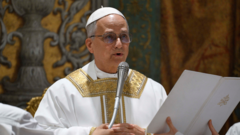Pope Leo XIV's first Mass emphasizes support for the marginalized and outlines a vision of modern faith engagement.
Pope Leo XIV Commits to Serving 'Ordinary People' in Inaugural Mass

Pope Leo XIV Commits to Serving 'Ordinary People' in Inaugural Mass
American-born pope calls for "missionary outreach" and addresses pressing issues within the Church.
During a historic inaugural Mass at the Sistine Chapel, Pope Leo XIV, the first American-born pontiff, vowed to prioritize the needs of "ordinary people" while delivering a poignant message against the backdrop of a world experiencing “appalling violations of human dignity.” This essential gathering summoned cardinals who participated in his election, underscoring the pontiff's commitment to fostering "missionary outreach" aimed at revitalizing faith within the Roman Catholic Church.
In his homily, Leo XIV, previously known as Cardinal Robert Francis Prevost, drew on themes from his predecessor Pope Francis, emphasizing the significance of inclusivity and the necessity of addressing the urgent humanitarian issues facing the Church. The new pope spoke candidly about a crisis of faith leading to disillusionment and neglect of core Christian tenets such as mercy. As he prepares to navigate the turbulent waters of contemporary Catholicism, Leo XIV's leadership will inevitably confront critical debates regarding the Church’s future direction.
Understanding his multifaceted background, Leo XIV embodies a global perspective shaped by his work in Peru and his roots in Chicago. He articulated aspirations to "build bridges," although specifics regarding governance remained unclear during his initial address to a global audience. His election has sparked widespread hope in Chicago, where local officials and fellow clergy members express confidence in his ability to impact the broader Catholic community.
Looking ahead, Pope Leo XIV's decisions will hold significant implications as the Church grapples with divisive issues ranging from clergy accountability to the role of marginalized groups within the faith. As he sets the stage for a new chapter, the upcoming days will reveal more about his approach to leadership and his commitment to social justice, solidifying a legacy built on the principles of compassion and unity.
In his homily, Leo XIV, previously known as Cardinal Robert Francis Prevost, drew on themes from his predecessor Pope Francis, emphasizing the significance of inclusivity and the necessity of addressing the urgent humanitarian issues facing the Church. The new pope spoke candidly about a crisis of faith leading to disillusionment and neglect of core Christian tenets such as mercy. As he prepares to navigate the turbulent waters of contemporary Catholicism, Leo XIV's leadership will inevitably confront critical debates regarding the Church’s future direction.
Understanding his multifaceted background, Leo XIV embodies a global perspective shaped by his work in Peru and his roots in Chicago. He articulated aspirations to "build bridges," although specifics regarding governance remained unclear during his initial address to a global audience. His election has sparked widespread hope in Chicago, where local officials and fellow clergy members express confidence in his ability to impact the broader Catholic community.
Looking ahead, Pope Leo XIV's decisions will hold significant implications as the Church grapples with divisive issues ranging from clergy accountability to the role of marginalized groups within the faith. As he sets the stage for a new chapter, the upcoming days will reveal more about his approach to leadership and his commitment to social justice, solidifying a legacy built on the principles of compassion and unity.






















